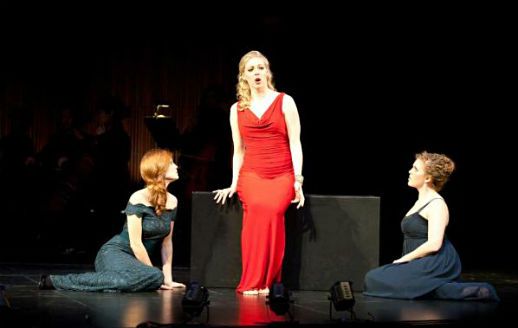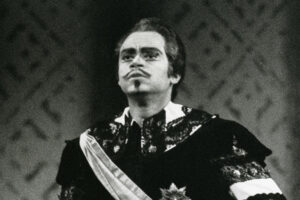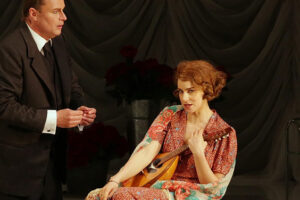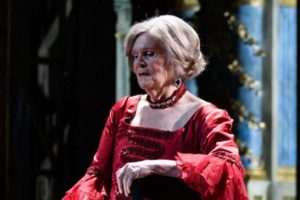

Unlike last year’s fully staged performances of Smetana’s Prodaná Nev?stá produced by Stephen Wadsworth and conducted by James Levine, the Armide at the Peter Jay Sharp Theater was a bare-bones semi-staging by Fabrizio Melano, conducted by Jane Glover. Unsurprisingly the evening lacked the glamour of 1912: Olive Fremstad, Enrico Caruso and Margarete Matzenauer, conducted by Arturo Toscanini with sets said to have been by Pierre Puvis de Chavannes, although I’m not sure quite how that worked since he died more that a decade before the MET production premiered on Opening Night of the 1910-11 season. Armide also has a history at Juilliard which staged it in 1999, one of the first operas I ever saw there. Back then—as now—I wondered about the wisdom of doing Armide without a real Armide.
Torquato Tasso created the pagan sorceress Armida in his 1580 epic poem “La Gerusalemme Liberata” recounting the exploits of various heroes during the First Crusade. The beautiful and powerful woman tortured by her love for seemingly the only man in the entire Christian army immune to her charms has proven irresistible to composers throughout opera history from Handel to Haydn, from Rossini to Dvo?ák to Judith Weir’s 2005 opera Armida.
In Tasso, Armida converts to Christianity and dies with the Virgin’s name on her lips; however, most operas instead conclude with her fury at her rejection by Rinaldo (the recalcitrant hero). Prima donnas from Maria Callas to Montserrat Caballé, Gundula Janowitz to Cristina Deutekom, Jessye Norman to Carol Vaness, Renée Fleming to Cecilia Bartoli have pined and raged as the lovesick Armida. And of course there is this most famous short souvenir of an Armida who sang the role at Covent Garden in the 1920s:
Jean-Baptiste Lully and his librettist Philippe Quinault created their Armide the first masterpiece (if not the first opera) about this anti-heroine in 1686. Has there ever been an opera so down on love–love is only an illusion, an inevitable fount of pain and loss. Quinault’s striking text was especially admired as scaling the heights of Racinian tragedy, particularly in Armide’s monologues “Enfin, il est en ma puissance” where she approaches the sleeping Renaud (Rinaldo) planning on killing him but is stopped by a growing awareness of her love for the mysterious invader; and “Le perfide Renaud me fuit” which concludes the opera as she berates herself for having surrendered to those tender feelings rather than dispatching him when she had the chance.
After the success in the mid 1980s of Lully’s Atys by Les Arts Florissants, conductor William Christie was often queried about reviving another Lully opera, and he often replied that he would when he found a piece as strong as Atys, so in 2008 he and Robert Carsen mounted Armide having found their ideal heroine in Stéphanie d’Oustrac, whose bewitching sorceress can be seen on DVD (along with the questionable frisson of viewing Laurent Naouri in a slinky red slip as La Haine!)
After being considered sacrosanct for nearly a hundred years, a vogue developed in the late 18th century of resetting some of Quinault’s libretti, perhaps to revivify the waning tragédie en musique tradition. Most were not successful and rarely revived, although Johann Christian Bach’s “Amadis des Gaule” was recently performed atParis’s Opera-Comique.
However, when Christoph Willibald Gluck brought forth Armide (set to Quinault’s libretto, omitting only the Prologue) as his fourth opera forParis, he created a worthy successor to Lully’s; how many other pairs of masterpieces are set to the exact same libretto?
After his two revolutionary “reform” operas were performed in Vienna, Gluck then conquered Paris with Iphigénie en Aulide followed by French versions of Orfeo ed Euridice and Alceste. It might have seemed odd that the “reformer” would have gone back nearly a century for his next libretto, but for Gluck often the past was the future, and in Armide there would be a chance to fashion his own great tragédie lyrique, even including two very “old-fashioned” divertissements in acts II and V that depict the sensual pleasures Armide conjures attempting to distract Renaud. Shamefully Juilliard cut nearly two-thirds of the act V scene, leaving only Gluck’s superb instrumental chaconne, a worthy mate to the Lully’s masterful passacaille.
In that challenging chaconne and throughout the evening the Juilliard Orchestra (onstage behind the singers) played very well for their guest conductor. I’ve not always been a fan of Glover’s operatic work (I recall a particularly droopy Ariodante at New York City Opera), but here she was always vividly responsive to the ever-shifting moods of Gluck’s music and also careful and attentive to her young singers.
As strongly as these young musicians played, it seemed a shame that Juilliard 415, the orchestra of the school’s much-ballyhooed Historical Performance Program, couldn’t have participated instead. In particular one missed the unique textures and colors that original instruments, particularly winds, would have brought to the score. Unfortunately, the chorus seemed generally bland and underpowered.
The young cast had an extra burden given the virtually non-existent production: little more than traffic-direction, no scenery, only cursory lighting changes and costumes which were mostly evening wear, jazzed up by dental-hygienist smocks for the Christian soldiers. Several performers stood-out, however. In the largely expendable (and sometimes cut) fourth act, Noah Baegte as the Chevalier Danois and particularly Luthando Qave as Ubalde shone as secure and stylish, along with Lilla Heinrich Szász as Lucinde, who showed as she had several weeks before at a Juilliard concert under Christie’s direction that she has real affinity for 18th century French music.
The high point of the evening was the spectacular third-act scene where Armide invokes the diabolical figure of Hate to help her rid herself of her helpless love for Renaud. Here mezzo Renée Tatum as La Haine was thrilling, despite a staging that made it seem more like sisterly bonding than an exorcism. And Deanna Breiwick was lovely as Une Bergère in the second act divertissement.
As Armide’s confidantes Phénice and Sidonie, Wallis Giunta and Devon Guthrie tended to simper and mug (with altogether too much vibrato) and missed the opportunity to help out their mistress by simply buying her a copy of He’s Just Not That Into You and thereby saving her a lot of heartache. Alexander Hajek as Hidraot, Armide’s uncle and co-conspirator, tended to bellow in mostly incomprehensible French.
Tenor David Portillo was just fine as Renaud, particularly when the music became more lyrical, less declamatory. He also showed some rare flair for the language which by and large eluded most of the cast, a near fatal problem for 17th and 18th century French opera where clear and nuanced declamation of the text is paramount.
And what of Armide? In the title role, Emalie Savoy (whom I had admired as Cavalli’s La Doriclea a few years ago at Juilliard) was puzzling. Tall, slim and beautiful (although I thought the tight red gown did her no favors), she gave a vigorous, committed performance, but in the end it seemed far more perspiration than inspiration. Is she really a soprano? Given that much of the high tessitura, particularly in the second half of the evening, was increasingly screamed, one has doubts. When the music was lower and softer, as in one passage during her monologue to the sleeping Renaud, the voice could be really quite lovely.
But Armide is an extremely long and demanding role requiring the singer to effortlessly declaim Quinault’s superb text with security and authority and that just didn’t happen here. While being grateful for the opportunity to hear Gluck’s great opera again (although it was done as recently as two years ago by the valuable Opera Lafayette at the Rose Theater), I left this production scratching my head—why chose an opera so dependent on a charismatic performer when there was apparently no great Armide available—surely Gluck’s operas, more than many, stand or fall on one commanding central role: Orfeo, Alceste, Iphigénie en Tauride, and Armide.
I asked if Dame Felicity Palmer (who recently had been in town teaching at the Met) was brought in to work with the production’s singers and with Savoyin particular. Apparently she was not, which is too bad since Palmer’s recorded portrayal—while imperfect (her voice could often be aggressively unattractive by that point)—has the necessary enthralling grand manner. The EMI-Richard Hickox CD is also valuable for Anthony Rolfe-Johnson’s ravishing Renaud.
The other complete recording by Marc Minkowski starring Mireille Delunsch is altogether more satisfying than the Hickox and has the added bonus of the ferocious La Haine of Ewa Podle? blazing demonically in her all-too-brief appearance.
Since last year’s Lindeman/Marcus production of Prodaná Nev?stá is rumored to be moving to the MET, one wonders if Armide is also some sort of try-out for the big house. Was I was the only one wishing that the stars of the Smetana, Layla Claire and Paul Appleby—spotted in Wednesday’s audience—had been on stage instead? If there is an Armide in the MET’s future, who might be cast in the iconic title role?
My recollection is that La Cieca back in the day attended a revival at La Scala of the lavish 1996 Pier Luigi Pizzi-Riccardo Muti production starring an inspired Anna Caterina Antonacci. As she’s rumored to be preparing for an upcoming Alceste, one hopes (probably in vain) that she could finally make that long-awaited Met debut as Armide. In the meantime, fans will have to be satisfied with Antonacci’s first New York appearance since 1999 on April 8th at Alice Tully Hall.
Photo: The Juilliard School, Nan Melville.
























Comments